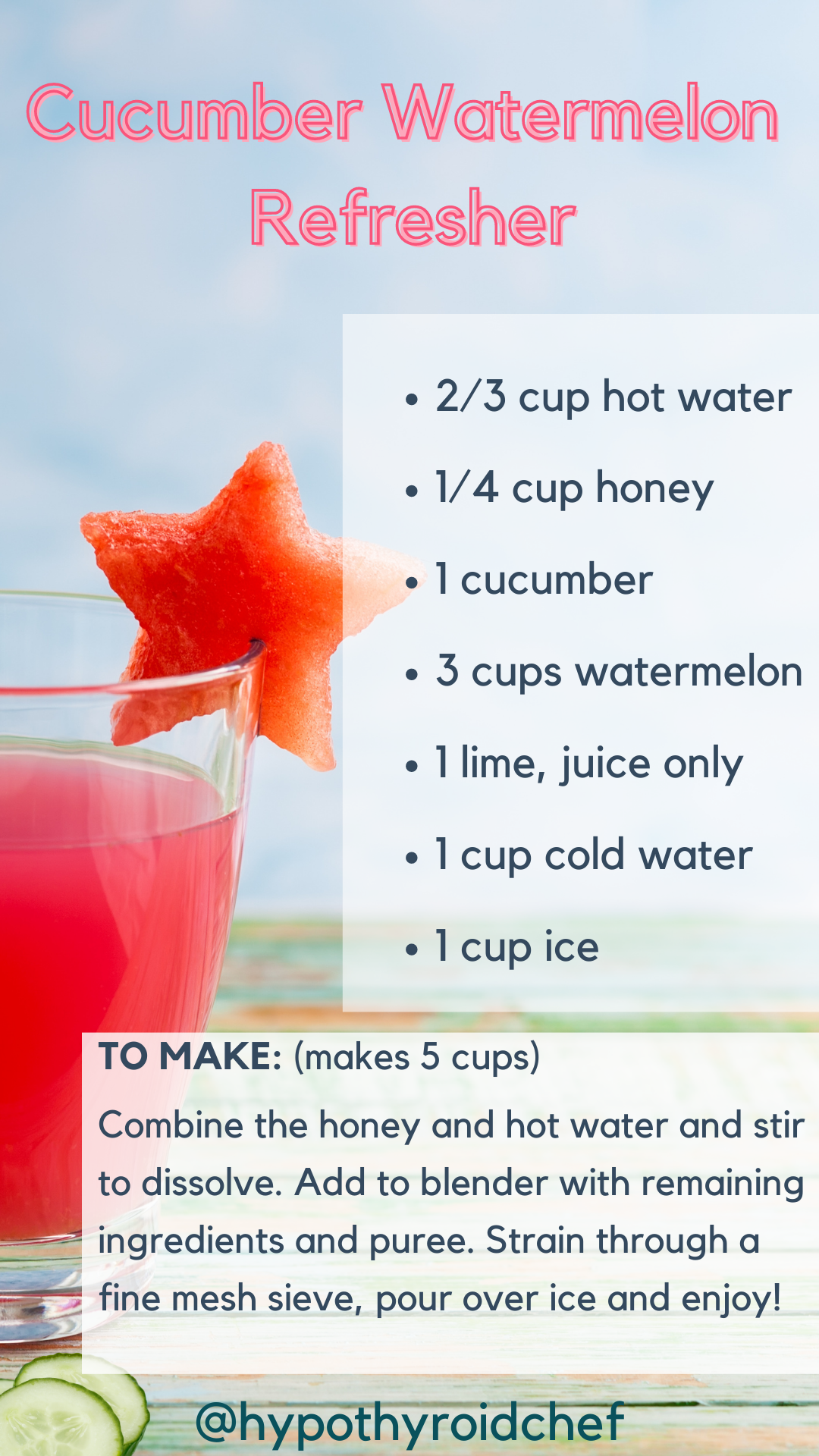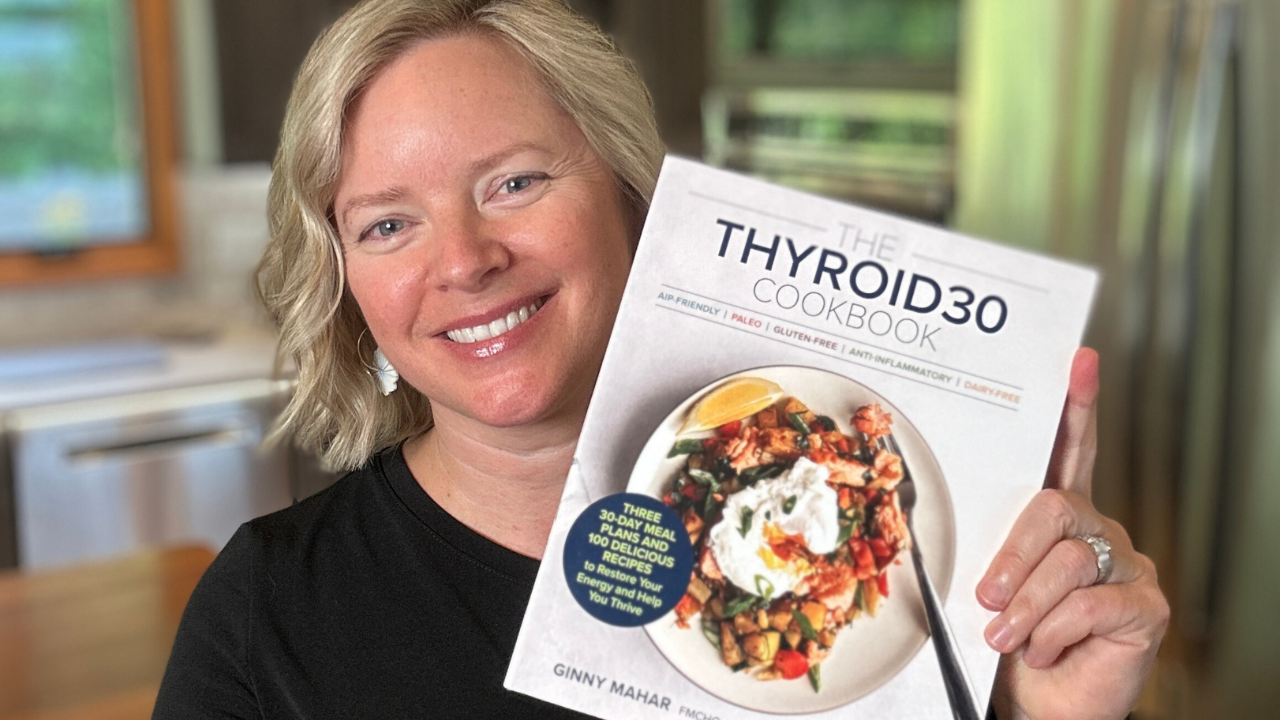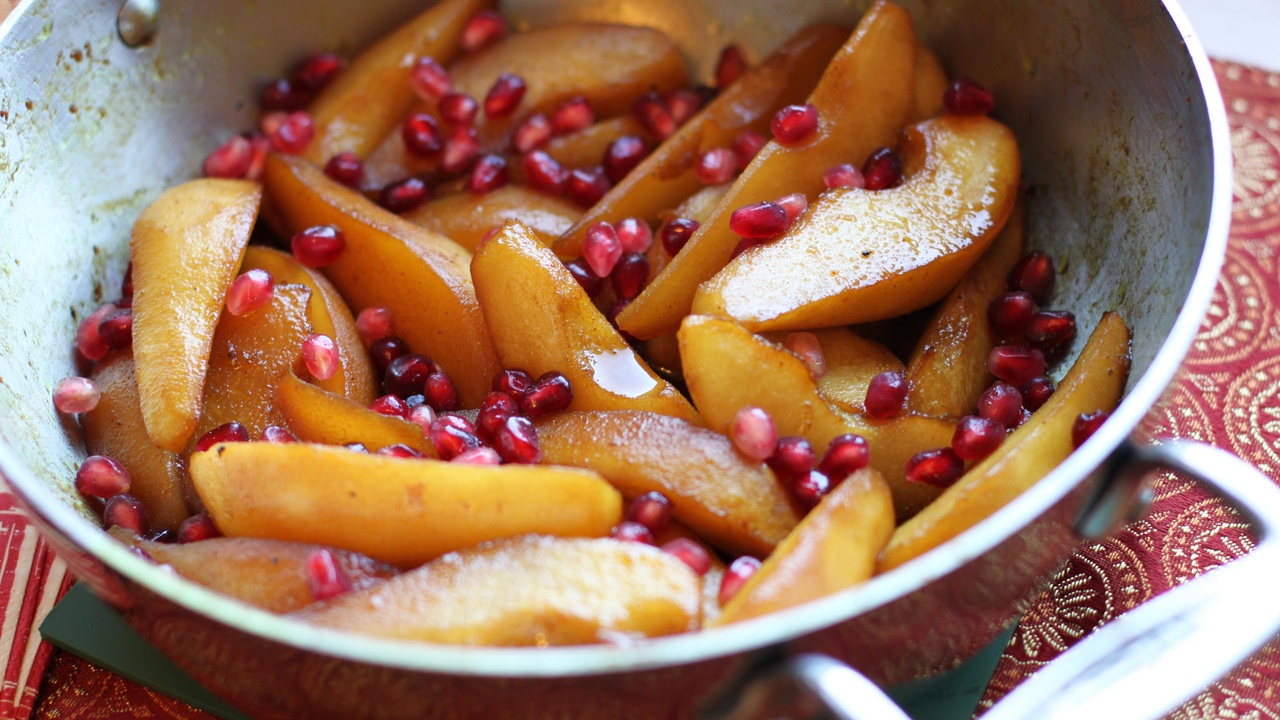Five Reasons Alcohol is Problematic for Hypothyroidism

Every party has a pooper, and I guess today, I'm it! Don't worry too much-- I'm not here to tell you that you can never enjoy another glass of wine but rather, to inform you about some good reasons to make careful choices around alcohol if you have Hypothyroidism or Hashimoto's.
Alcohol may not be the only factor in how you feel, but it can be a compounding factor in aggravating symptoms, diminishing thyroid function, and not feeling your best. In this blog post and podcast episode, we'll explore why. I'll highlight five reasons to rethink your drink, especially if you have an underactive or missing thyroid. We'll also cover the best choices for when you choose to consume alcohol. Finally, because nobody likes to feel deprived, I'll share my favorite beverage alternatives and relaxation replacements for alcohol.
Full disclosure: Some of the links in this post may be affiliate links. As an Amazon Associate, I earn from qualifying purchases. Purchasing a product using one of these links will support my work at no additional cost to you. Please know that I only recommend products I wholeheartedly stand by.
Disclaimer: This content is for educational and informational purposes only. Always consult with your doctor or other qualified healthcare provider before making changes to your diet, health care, or exercise regimen.
Show Notes:
- Recommended reading: Quit Like a Woman by Holly Whitaker
- Dry Farm Wines (get a free bottle with this link)
- HigherDose Infrared Sauna Blanket [15% OFF Code: HYPOCHEF15]
- Coaching: Book a free discovery call with me!
- FREE Thyroid-healthy Grocery Guide
Podcast Links:
- Listen on the podcast page
- Subscribe on iTunes
- Follow on Spotify
- Subscribe on YouTube
- Subscribe on Google Podcasts
- Subscribe on Amazon Music
- Listen on Stitcher
Five Reasons Alcohol is Problematic for Thyroid Thrivers
Cataloging ALL of the ways in which alcohol impacts other areas of our health, like premature aging, links to several types of cancer, impaired detoxification, and skin issues, could fill a book. Keep in mind this list is non-exhaustive.
Here, I've tried to focus on some of the most pertinent impacts of alcohol for Thyroid Thrivers.
1. Your Liver
One reason alcohol is particularly harmful to thyroid function is that it affects the liver. The liver is responsible for much of the conversion of the inactive T4 hormone into the active T3 hormone. When alcohol reaches the liver, it produces an enzyme called acetaldehyde. Acetaldehyde is a poisonous enzyme that can damage liver cells and cause permanent scarring. When the liver isn’t in tip-top shape, thyroid hormone conversion can decrease, and overall metabolism can deteriorate.
2. Your Gut Health
Gut health is another reason alcohol is lousy for thyroid patients. Like the liver, the gut is one of the main ways inactive T4 thyroid hormone is converted into active T3. If our gut is impaired, our thyroid function will be impacted.
Alcohol is also one of the most destructive toxins for gut flora. It can contribute to gut dysbiosis (the overgrowth of bad gut flora) and intestinal permeability (a.k.a. leaky gut).
Alcohol exposure can stimulate the growth of Gram-negative intestinal bacteria, considered one of the world's leading health threats. These bacterial strains are resistant to antibiotics and can lead to serious, life-threatening infections like pneumonia or meningitis. They also lead to a buildup of endotoxins which permeate the gut lining and trigger inflammation. As Thyroid Thrivers, leaky gut and inflammation are the opposite of what we want if feeling well, diminishing symptoms, and staying healthy is our goal.
On another gut-related note, our digestion and absorption of nutrients are impaired by alcohol-- another ding on our overall health score.
3. Your Hormones
Need one more reason to reconsider your nightly nip? All alcohol is estrogenic. That includes beer, wine, and liquor. Estrogenic activity can cause adverse health effects in mammals: early puberty in females, altered functions of reproductive organs, obesity, altered sex-specific behaviors, and increased rates of some cancers. It also makes it more difficult to lose weight – a major frustration for many with thyroid issues. These estrogenic effects of alcohol were observed even at moderate drinking levels.
4. Your Sleep
Many of us rely on alcohol to wind down in the evenings and help us fall asleep. While alcohol may help us fall asleep faster, it severely diminishes the quality and restorative effects of our sleep.
According to Holly Whitaker, author of "Quit Like A Woman: The Radical Choice to Not Drink in a Culture Obsessed by Alcohol," not only does alcohol diminish the amount of brain-restoring slow-wave sleep we get, it cuts our REM sleep from seven cycles per night, down to two. The result? More anxiety, depression, irritability, and hunger.
Because it takes three to four days to fully remove alcohol from the system, "even moderate alcohol use," says Whitaker, "puts us in an almost constant state of sleep deprivation."
For Thyroid Thrivers, sleep is essential to brain health, mental health, thyroid function, digestion, weight loss, muscle building and recovery, hormone health, and immune health. What's worse is that we're already more prone to sleep issues like insomnia and frequent waking with hypothyroidism or Hashimoto's. If you're having trouble sleeping, alcohol is more of a hindrance than a help.
5. Your Weight Loss Efforts
While not all Thyroid Thrivers are trying to lose weight, excess weight and weight loss resistance are my coaching clients' most common complaints and frustrations. Because the thyroid controls our metabolism, thyroid issues can impair metabolic function, even if you're on thyroid medication. This can make weight gain more easy and weight loss more difficult.
Alcohol can compound this issue, as it promotes weight gain through liver impairment, blood sugar imbalance, and excess calories and inhibits weight loss by diminishing liver, digestive, and thyroid function.
Alcohol also lowers our inhibitions and impairs our judgment. Exercising good choices around food is much easier without it. This is true both while intoxicated and the next day when battling hangover effects. After-effects of drinking can make us more likely to consume high-sugar, high-carb, inflammatory foods and less likely to engage in healthy exercise.
If You're Going to Drink, Which Choices Are Best?
If we consume alcohol, it's important to be mindful of the type of alcohol we drink. Let's compare choices:
- Go for low-sugar drinks. A vodka and plain soda water with a squeeze of lime and maybe a small splash of cranberry juice will be less detrimental to your health than a drink made primarily of sugary fruit juice, simple syrup, or high-sugar soda pop. Lower-sugar drinks help minimize glucose spikes, hangover symptoms, and sleep disruptions.
- Choose clear spirits over brown. Some experts recommend sticking to clear spirits like tequila or vodka over brown spirits like bourbon or rum. They're the lowest in sugar and calories and, therefore, easier to metabolize. Clear spirits are also more purified during the distillation process than brown spirits are. All alcohol contains impurities, known as congeners, but brown liquors typically have significantly more of these impurities, which can worsen the negative effects of alcohol, including hangovers.
- Beer is a NO for most of us because of gluten. If you're avoiding gluten, as most Thyroid Thrivers are, beer is a no-go. Replacing it with something like a hard kombucha can scratch the itch for a fizzy, low-alcohol refreshment while also adding probiotic benefits.
- Source your wine carefully. Many commercially produced wines now contain so many additives, sulfites, and flavorings they're like a highly processed food. If you are going to enjoy wine, it's best to source clean, low-sugar wines like those curated by Dry Farm. This is my favorite go-to when wine is on the menu because I know they're clean, lower in sulfites, lower in alcohol, and additive-free.
Further Reading: Cooking with Wine the Thyroid-healthy Way
Sure, there are better alcohol choices than others, but here's the bottom line: The most thyroid-healthy choice is to trade in the ethanol for something else, like this Virgin Martini (pictured below).
Beverage Alternatives to Alcohol
While alcohol consumption is falling with younger generations, many of us were raised with alcohol as a norm. Culturally, alcohol is still pervasive. We celebrate, dine, socialize, and relax with alcohol.
You can still enjoy all those things without alcohol; with time, perhaps even more so. It may take some patience and tinkering, but here are some of my favorite drink alternatives...
- Staple Spritzer: Combine sparkling mineral water with a splash of unsweetened, 100% tart cherry, cranberry, or pomegranate juice and a squeeze of lime. A quick and easy staple!
- Virgin Martini: Pour some sparkling mineral water over ice, squeeze in a few drops of digestive bitters, and stir with a cocktail pick full of olives. This unique and sugar-free mocktail is like a pre-meal warm-up for your digestion.
- Golden Milk makes a delicious and comforting evening treat with an anti-inflammatory body buzz from turmeric and ginger. This one's excellent during colder months.
- Lemon Ginger Toddy: While a traditional toddy contains a splash of whiskey, it's just as tasty and better for us without. In a mug, combine hot water with a few slices of fresh ginger, lemon, and a dollop of honey. Add a sprinkle of cayenne for a warming, metabolism-boosting kick.
- Citrus Chia Fresca is a thirst-quenching and chuggable recovery drink, packed with electrolytes, potassium, and vitamin C, plus an added nutritional boost of chia seeds.
- This Cucumber Watermelon Refresher (recipe below) is something special on a hot summer day. A perfect refreshment to share with friends!

Further Reading: 5 Thyroid-healthy Hot Drinks
Relaxation Alternatives to Alcohol
One thing to remember is that it isn't just the drink we need to replace; it's the relaxation factor. If there's one thing alcohol does effectively, it relaxes us. When I started my #sobercurious path, I remember noticing at first that my neck muscles were becoming uncomfortably tight. I couldn't figure out why until one night, I had a glass of wine with dinner and went, "Oh yeah, now I remember what it feels like when those muscles relax!"
So, do I walk around now with tight neck muscles all the time? Of course not! But I had to learn alternative ways to relax and manage stress along the way.
Ramping up your self-care is one of the best ways to support this part of your healing journey. Not only will you find healthier ways to manage stress, you'll soon find that you're sleeping better, are less inclined to engage in things like stress-eating or stress-drinking, and are happier, less anxious, and less depressed overall.
PRO TIP: Self-care is one of the BEST ways to curb the urge for alcohol.
Relaxation Alternatives:
- Epsom Salt Baths: Baths are wonderful before bed, and adding Epsom salt or magnesium flakes is a great addition for pain relief and muscle relaxation. Try keeping the water close to body temp (98.6 F) to relax and heal without draining the body.
- Sauna: Heat therapy and sweating are fantastic ways to relax and release toxins. Sauna therapy is touted by nearly all the functional thyroid doctors I follow and has been personally recommended to me to diminish Hashi's symptoms by two naturopaths and a nutritionist I work with. Sauna is another fantastic pre-bedtime option. Of course, not many of us have a sauna in our homes. I use (and love) this crystal-lined Infrared Sauna Blanket from Higher Dose. GET 15% OFF WITH CODE: HYPOCHEF15
- Journaling: When alcohol isn't there to use as an escape from your problems, you may find some trouble spots in your life that need to be addressed. This is some of the most beneficial healing work a Thyroid Thriver can do, but it can sometimes be a little messy. What if there was a place where you could let it all out? Even the messy stuff. Where you could speak your truth without the worry of hurting anyone’s feelings or being judged? That’s journaling! And it turns out that it’s surprisingly beneficial to our mental health. No rules. Just be real, and keep writing.
- Red Light Therapy: I fell in love with red light therapy while recovering from frozen shoulder-- a painful condition associated with Hashimoto's! There are many types of red light therapy devices, but I love to relax with this Red Light Therapy Belt when we're watching movies. I just put it wherever my body needs some TLC-- back, shoulder, knees, or even over my gut and liver to promote cellular health in those areas. It stimulates collagen, supports mitochondria, promotes sleep, and penetrates deep for pain relief and recovery.
- Walking, especially in Nature: One benefit you'll find when cutting out alcohol is increased energy. What better way to use it than replacing that after-dinner drink with an after-dinner stroll? Bonus points if you get out into nature. Visiting a favorite tree-canopied area, and walking in a relaxed, restorative way (a.k.a. Forest Bathing), has been proven to boost immune function, mood, and energy, while reducing stress, depression, anxiety, and anger. It can also be a great way to get those steps in.
- Heat therapy: Remember that neck and shoulder tightness? This Neck and Shoulder Heating Pad is my new go-to for that-- no wine required! Not only does it relax those tight muscles, but it's also great when you're feeling that hypothyroid chill!
Need more ideas for how you can manage stress without alcohol? Check out this list of 30 Ways to Hit Your Refresh Button!
In Conclusion
Minimizing your alcohol consumption or taking extended breaks from alcohol can be helpful and healing for Thyroid Thrivers in several ways. It can give the liver and gastrointestinal lining a break to rebalance and regenerate tissues, help to lower estrogen levels and boost nutrient absorption. This can restore and support the function of all bodily systems, not just the thyroid. Also, sleeping better, successful weight loss, better mental health, and more balanced hormones are additional benefits of avoiding alcohol.
While eliminating alcohol entirely may not be necessary for you, it's important to be aware of these risks and impacts of alcohol consumption to make the most empowered and informed choices for your health. If alcohol is a regular habit in your life, you can show your liver and thyroid some love by reducing or eliminating your alcohol intake. You may even feel so much better that you decide to stay alcohol-free or mostly alcohol-free for good!
I hope this has given you some food (and drink) for thought, along with a dose of encouragement to make the choices that help you THRIVE! Cheers to your health!

P.S. Need more thyroid-friendly recipe inspiration? I’ve got you covered. My Thyroid-friendly Everyday eCookbook features over 50 quick and easy, thyroid-friendly recipes your whole family will love. To take a peek at what’s inside, CLICK HERE.
Sources:
- https://www.ncbi.nlm.nih.gov/pmc/articles/PMC5583943/
- https://www.ncbi.nlm.nih.gov/books/NBK538213/
- https://www.ncbi.nlm.nih.gov/pmc/articles/PMC2614138/
- https://www.ncbi.nlm.nih.gov/pmc/articles/PMC10096942/
- https://www.ncbi.nlm.nih.gov/pmc/articles/PMC6761902/
- https://www.ncbi.nlm.nih.gov/pmc/articles/PMC8423342/
- Whitaker, Holly. Quit Like a Woman: The Radical Choice to Not Drink in a Culture Obsessed With Alcohol. First edition. New York, The Dial Press, 2019.
- https://www.healthline.com/health/alcohol-and-weight-loss
- https://www.bbcgoodfood.com/howto/guide/15-of-the-healthiest-alcoholic-drinks
- https://www.healthdigest.com/586245/the-big-difference-between-clear-and-dark-alcohols/
- https://www.insider.com/guides/health/diet-nutrition/healthiest-alcohol
- https://www.urmc.rochester.edu/encyclopedia/content.aspx?ContentID=4552&ContentTypeID=1
- https://www.natureandforesttherapy.earth/about/the-practice-of-forest-therapy
Subscribe to my free newsletter for fresh recipes & lifestyle tips, delivered weekly, and receive a free gift!
By submitting this form, you agree to receive ongoing updates from Hypothyroid Chef












